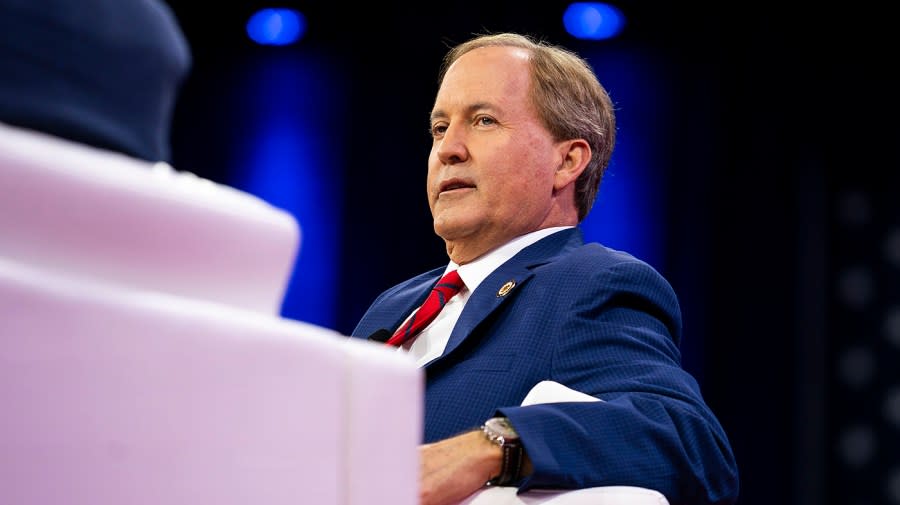Texas AG Paxton probes Boeing supplier, takes aim at DEI practices

Texas Attorney General Ken Paxton (R) is investigating a major supplier of aerospace company Boeing, whose flagship 737 MAX aircraft has been linked to a series of deadly accidents since 2018.
“The potential risks associated with certain airplane models are deeply concerning and potentially life-threatening to Texans,” Paxton said in a statement.
Paxton ordered Spirit AeroSystems to turn over documents related to manufacturing defects that led to the grounding of dozens of Boeing planes — as well as documentation concerning the company’s decision to fire whistleblower Joshua Dean after he reported them.
But part of Paxton’s request for information also implied that the company’s diversity, equity and inclusion (DEI) policy may be linked to a recent string of dangerous mishaps.
“While we do not comment on investigations, Spirit is wholly focused on providing the highest quality products to all our customers, to include the Boeing Company,” Spirit spokesman Joe Buccino told The Hill.
The Hill has reached out to Boeing for comment.
In his order, Paxton demanded the company substantiate its claim that “‘a diverse workplace improves product quality’ … ‘enhance[s] performance’ and/or ‘helps [Spirit] … make better decisions.’”
He also told the company to explain how employee demographics “for race, national origin, sexual orientation, and age” had changed since the adoption of a 2022 DEI policy.
Paxton’s investigation follows a series of costly and sometimes deadly accidents involving Boeing aircraft. In 2018 and 2019, 737s crashed in Indonesia and Ethiopia repeatedly, killing a total 346 people.
In January, a door on an Alaska Airlines 737 — part of the plane manufactured by Spirit — blew off the plane.
In February, Boeing halted deliveries of 50 planes after Spirit reported that holes had been drilled incorrectly during the installation of windows, The Associated Press reported.
“We’re having a pizza party because we’re lowering defects,” Dean, who was a quality auditor at the factory before his firing, told National Public Radio.
“But we’re not lowering defects. We just ain’t reporting them, you know what I mean?”
Dean asserted that Spirit was “sending out a message to anybody else” with its treatment of him: “If you are too loud, we will silence you.”
In February, the chief executive of Emirates airlines told the Financial Times that Boeing had suffered a “progressive decline” as the company prioritized short-term financial returns over safety and high quality engineering.
“They’ve got to get their manufacturing processes under review so there are no corners cut,” CEO Tim Clark told Financial Times. “This is the last chance saloon.”
On Thursday, The American Prospect published a scathing investigation into how Boeing had over the past decade fired or driven out senior engineers.
Noting that a prior policy from aerospace manufacturer McDonnell Douglas recommended that engineers needed four years on staff to become good at their jobs, the head of the Boeing engineers union told the The American Prospect that “the average employee assigned to the 737 program has been at Boeing just five years.”
The American Prospect quoted a “longtime Boeing executive who is involved in various efforts to save the company” who told reporters that “for comparison’s sake … the average employee assigned to the 777 program had between 15 and 20 years under their belt.”
To some, the defects at Boeing are connected to the broader rise of consolidated business interests in American life in recent decades.
In a February speech, Federal Trade Commission Chair Lina Khan cited Boeing as an example of a once-great American corporation hollowed out by monopoly and management consulting.
A drop in “quality is one of the harms that most economists expect from monopolization, because firms that face little competition have limited incentive to improve their products,” Khan said.
She noted “reporting suggests that Boeing executives began to view their knowledgeable workforce as a cost, not an asset, with tragic outcomes.”
While conservatives sometimes focus on the dangers of monopoly as a driver of issues at Boeing and other corporations — Paxton has led investigations of big tech companies on those grounds — they have also targeted other potential culprits.
Paxton’s order comes amid a broader push by conservative policymakers and thought leaders that blames diversity initiatives for a wide range of failures in American corporate life.
“The innocuous sounding notion of Diversity, Equity and Inclusion (DEI) has been manipulated to push policies that expressly favor some demographic groups to the detriment of others,” Gardner Pate, chief of staff for Texas Gov. Greg Abbott (R), wrote last year.
In a blog post called “Diversity is going to get us killed,” conservative writer Rod Dreher linked the problems at Boeing to the company’s hiring policies.
“I’m not saying that non-white or non-Asian engineers are subpar. I’m saying that if you hire for any reason other than excellence, you are weakening your product or service.”
Four of Paxton’s 14 demands for information from Spirit concern company diversity and hiring programs.
“I will hold any company responsible if they fail to maintain the standards required by the law and will do everything in my power to ensure manufacturers take passenger safety seriously,” the attorney general wrote.
For the latest news, weather, sports, and streaming video, head to The Hill.


